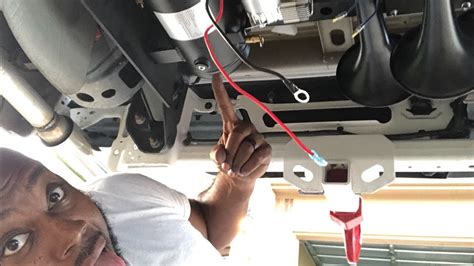How To Install Train Horns On A Truck
Ronan Farrow
Apr 01, 2025 · 3 min read

Table of Contents
How to Install Train Horns on Your Truck: A Comprehensive Guide
Want to make your truck sound like a freight train? Installing train horns can significantly enhance your truck's presence and give it a unique, powerful sound. This guide will walk you through the process, covering everything from choosing the right horns to completing the installation.
Choosing the Right Train Horns
The first step is selecting the appropriate train horns for your truck. Consider these factors:
Sound Level:
- Air Compressor Power: The compressor's power directly impacts the horn's loudness and how frequently you can use it without overheating. More powerful compressors are necessary for louder horns.
- Decibel (dB) Rating: Higher dB ratings mean louder horns. Check local regulations regarding noise levels; excessively loud horns might be illegal.
- Tone/Pitch: Train horns come in various tones, from low and rumbling to high and sharp. Choose a tone that suits your preference and the overall aesthetic of your truck.
Horn Type:
- Single Trumpet: A simpler setup, ideal for those seeking a less intense sound.
- Dual Trumpet: Offers a richer, more traditional train horn sound.
- Multiple Trumpets: Provides a more complex and powerful sound, but requires a larger compressor.
Mounting Options:
- Consider your truck's size and the available space: You need to ensure you have a secure and accessible location to mount the compressor and horns.
Essential Tools and Materials
Before starting the installation, gather the necessary tools and materials:
- Train Horns: Your chosen horns.
- Air Compressor: A powerful compressor capable of handling the horns.
- Wiring Harness: A properly sized wiring harness for connecting the horns and compressor. This often comes with the horn kit.
- Relays: Relays protect your truck's electrical system by switching the high current of the horn circuit.
- Air Lines & Fittings: Durable air lines to connect the compressor to the horns.
- Mounting Brackets: Secure and appropriate mounting brackets for the compressor and horns.
- Electrical Tape: For securing wires.
- Tools: Wrench, socket set, drill, wire strippers, crimping tool, multimeter (optional for testing).
Step-by-Step Installation Guide
This guide offers a general overview. Always refer to your specific horn kit's instructions for detailed guidance.
1. Planning & Mounting:
- Locate mounting positions: Find secure locations for the compressor and horns, considering weight distribution, accessibility, and potential vibration. Protect painted surfaces.
- Prepare mounting brackets: Install the brackets securely in your chosen locations.
2. Air Line Installation:
- Connect air lines: Run the air lines from the compressor to each horn, ensuring secure connections using appropriate fittings. Avoid kinks and ensure sufficient line length.
3. Electrical Wiring:
- Connect the wiring harness: Carefully connect the wiring harness to the compressor, horns, and relays according to the included instructions. Pay close attention to positive (+) and negative (-) connections.
- Route wiring: Route the wiring carefully and neatly, securing it with zip ties to avoid damage or interference.
- Connect to the Battery: Connect the power wire to the battery, preferably through a fuse to prevent damage.
4. Testing and Adjustments:
- Test the system: Turn on the system and check that the horns are functioning properly.
- Adjust air pressure: Adjust the air pressure as needed to optimize sound.
- Fine-tuning: Make any adjustments to ensure proper operation and a desirable sound level.
Safety Precautions
- Always disconnect the battery's negative terminal before beginning any electrical work.
- Ensure all connections are secure to avoid short circuits or malfunctions.
- Be mindful of noise regulations in your area.
- Regularly check the air lines for leaks and damage.
Conclusion
Installing train horns can significantly enhance your truck's aesthetic appeal and sound. By following this guide and taking necessary safety precautions, you can successfully complete the installation. Remember to always consult your specific horn kit's instructions for precise guidance. Happy honking!
Featured Posts
Also read the following articles
| Article Title | Date |
|---|---|
| How To Pack Makeup For Moving | Apr 01, 2025 |
| How To Install Google Chrome On Debian 12 | Apr 01, 2025 |
| How To Make False Teeth Look Real | Apr 01, 2025 |
| How To Install Roof Boot | Apr 01, 2025 |
| How To Program A Jeep Key With Only One Key | Apr 01, 2025 |
Latest Posts
Thank you for visiting our website which covers about How To Install Train Horns On A Truck . We hope the information provided has been useful to you. Feel free to contact us if you have any questions or need further assistance. See you next time and don't miss to bookmark.
